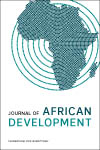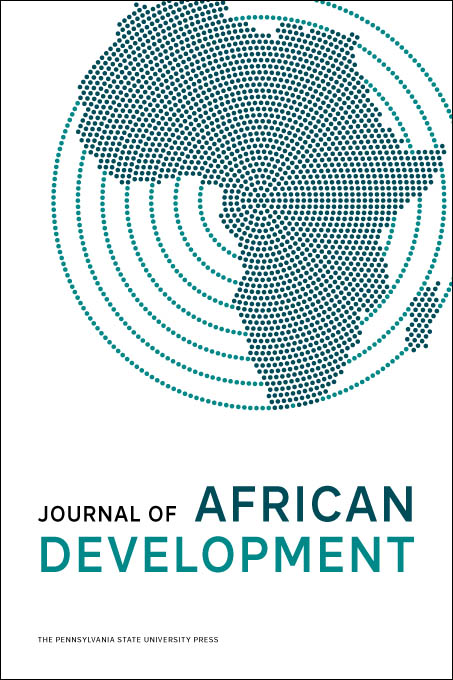Journal of African Development
Evelyn F. Wamboye, Editor
- Description
- Board
- Submissions
- Pricing
- Indexing
- ToC
Access current issues through Scholarly Publishing Collective.
The Journal of African Development (JAD) was first published in 1988 as Journal of African Finance and Economic Development. It is a top ranked journal in Africa’s development economics. It publishes double anodized peer reviewed original research papers relating to all aspects of Africa’s development economics—from immediate policy concerns to structural economic and development challenges. While the emphasis is on quantitative work that is novel and relevant, groundbreaking theoretical work is highly encouraged.
Articles that take up questions on Africa’s development economics that are of interest to the general readers of JAD, from both micro and macro perspectives are welcomed. Those that provide in-depth studies of a specific country, region, cross-country, industry, firm, organization(s) or cases, and whose findings are likely to be of great interest to the general readers of JAD, with attainable and specific policy recommendations, will be considered.
JAD is the official publication of the African Finance and Economic Association (AFEA). AFEA is a professional association for academicians and practitioners (government and industry) of economics, finance, and related disciplines with scholarly, professional, or other similar interests in the development of Africa. Membership in AFEA is open to individuals and organizations having an interest in the development, understanding, teaching, and application of the principles and theories of economics and finance as they relate to Africa.
Editor
Evelyn F. Wamboye, The Pennsylvania State University, US
Associate Editors
Samuel Amponsah, Tokyo International University, JP
Mina Baliamoune-Lutz, University of North Florida, US
Nihal Bayraktar, The Pennsylvania State University, Harrisburg, US
Nicola D. Coniglio, University of Bari Aldo Moro, IT
Eduard Marinov, New Bulgarian University, BG
Jean-Claude Maswana, Ritsumeikan University, JP
Nicholas Mbaya Odhiambo, University of South Africa, ZA
Victor Owusu, Kwame Nkrumah University of Science and Technology, GH
Editorial Board
Gold Kafilah ‘Lola, Kwara State College of Education, NG
Olatundun Janet Adelegan, Aalto University, FI
John Anyanwu, Retired, African Development Bank, CI
Abidemi Fasanmi, Cape Breton University, CA
Bichaka Fayissa, Professor Emeritus, Middle Tennessee State University, US
Kwabena Gyimah-Brempong, University of South Florida, US
Ismael Y. Mourifié, Washington University in St. Louis, US
Florence Kyoheirwe Muhanguzi, Makerere University, UG
Léonce Ndikumana, University of Massachusetts Amherst, US
Ikechukwu D. Nwaka, University of Alberta, CA
Gbadebo Odularu, Howard University, US
Eric Evans Osei Opoku, University of Nottingham Ningbo China, CN
Majune Kraido Socrates, University of Nairobi, KE
John M. M. Ssozi, Baylor University, US
Bedassa Tadesse, University of Minnesota, Duluth, US
Guy Tchuente, Purdue University, US
Mwangi wa Githinji, University of Massachusetts-Amherst, US
All papers, in English, should be submitted electronically through the online submission system, Editorial Manager (EM) http://www.editorialmanager.com/JOAD. The system guides you stepwise through the process of entering your article details and uploading your files. It converts your article files to a single PDF file used in the peer-review process. Papers should have a minimum of 4,500 words and not exceed 8,000 words. Refer to these submission guidelines before uploading your manuscript.
The journal operates a double anonymous review process which means that the identities of authors are concealed from the reviewers and vice versa. All contributions will be initially assessed by the editor for suitability for the journal. Papers deemed suitable are then typically sent to a minimum of two independent expert reviewers to assess the scientific quality of the paper. The editor is responsible for the final decision regarding acceptance or rejection of articles. The editor's decision is final.
JAD charges a submission fee of US$ 50.00. This fee is non-refundable and cannot be waived under any circumstances. The submission fee will not be refunded if a manuscript is rejected by the editors without being sent for review, if it is inconsistent with the journal's aims and scope, or does not adhere to the style requirements as outlined in the Guide for Authors document. The submission fee, which is different from a publication fee or article processing charge (APC) is used to offset costs of producing JAD.
Institutional Online - $167.00
Institutional Print - $174.00
Institutional Online & Print - $244.00
Institutional Single Issue - $94.00
Individual Online - $46.00
Individual Print - $48.00
Individual Online & Print - $66.00
Individual Single Issue - $32.00
Outside US add Shipping & Handling - $13.00
European Reference Index for the Humanities and Social Sciences (ERIH PLUS)
Web of Science, Emerging Sources Citation Index
FORTHCOMING TABLE OF CONTENTS
JAD 27.1 (2026)
Violent Conflict Exposure and Household Welfare Lessons from Nigeria Using Panel Data
Ruth Uwaifo Oyelere, John Chiwuzulum Odozi
Employment Mobility and Returns to Technical and Vocational Training: Empirical Evidence for Tanzania
Cornel Joseph, Vincent Leyaro
The Effects of Barriers to Physical Capital Accumulation on Ghana’s Post-Independence and Future Economic Growth: An Application of the Neoclassical Growth Model
Emmanuel Ameyaw
Agricultural Exports and Agricultural Productivity in the Selected East African Community Countries
Daniel Otieno Jabuya, Fredrick Odhiambo Sule, Michael Jairo Ndwiga
The Role of Political Uncertainty, Mineral Rents, and Institutional Quality in Shaping FDI and Economic Growth in Sub-Saharan Africa
Manayubahwe Kazana Leonidas, Richard Kabanda, Luqman Olanrewaju Afolabi
JAD 27.2 (2026) SPECIAL ISSUE: DFSP-EAC: Think Tanks - Country Case Studies
Bank Competition, Digital Finance, and Gender Differences in Financial Inclusion in East Africa
Peter Wamalwa, Samuel Tiriongo, Hillary Mulindi
Digital financial services through mobile phones: What it takes to bring inclusivity to rural women in developing countries – The case of Tanzania
Lanta Daniel, Bitrina Daniel Diyamett, Dennis Nestory Mwighusa
Disability, Digital Financial Services and Financial Inclusion: Evidence from Rwanda
Ggombe Kasim Munyegera, Precious Akampumuza, Seth Kwizera
Mobile money usage: a comparative analysis of Burundi with other east African countries
Jean Claude Nyamweru, Michel Armel Ndayikeza, Arcade Ndoricimpa
The Monetary Economics of e-Money and Policy Implications: Evidence from Uganda
Nicholas Okot, Isaac M. B. Shinyekwa, Justine Luwedde, Enock N. W. Bulime
JAD 28.1 (2027)
Can digital transformation improve trade performance? Evidence from Africa
Mohammed Shuaibu, Mamello Amelia Nchake
Digital Literary, Technological Access, And Cybercrime in Sub-Saharan African Countries
Forget M. Kapingura
Does Aid to The Productive Sectors Cause Manufacturing Sector Growth in Africa?
Ndikumana Alain
Structural Change, Gender Development, and Gender Inequality: Sub-Saharan Africa
Richard Grabowski, Sharmistha Self
Multiple, Polarized and Vulnerable: A Socio-Economic Exploration of Ghana’s Middle Class
Eric Rougier, Matthieu Clément, François Combarnous, Robert Darko Osei, Stephen Afranie
The Role of Financial Inclusion in Enhancing Household Economic Well-being in Senegal
Khadim Ba, Seydi Ababacar Dieng
JAD 28.2 (2027) SPECIAL ISSUE: DFSP-EAC: Financial Inclusion and Market Development in EAC Economies
Access to digital financial services and women empowerment: Evidence from rural Rwanda
Rosemary Botha, Tony Mwenda Kamninga, Tuyisenge Methode
Determinants of mobile money adoption and use in poor and least digitalized countries: Case of Burundi
Saidi Biboza, Gildas Irakoze
Drivers of the gender gap in use of digital financial services: Evidence from Uganda
Ambrose Ogwang, Rehema Kahunde, Maya Denis Makika
Promoting Gender Inclusion in Digital Financial Services: Evidence on Policies and Socio-Economic Factors in Kenya
Cox Lwaka Tamba, Immaculate Kathomi Murithi
Who's More Likely to Pay the Tax on Mobile Money Withdrawals
Karia Sekumbo, Noela Sadikiel Ringo, Constantine Manda
Mailing List
Subscribe to our mailing list and be notified about new titles, journals and catalogs.




